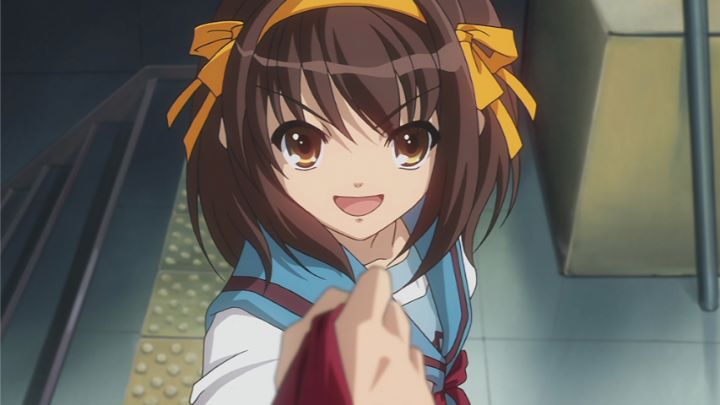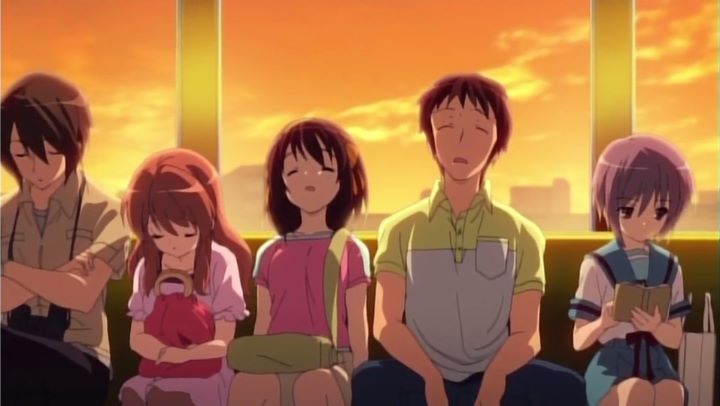






When I was growing up in the mid-2000's, I recall "Haruhi Suzumiya" being a huge thing. I didn't watch a lot of anime at the time, but somehow the franchise would peak in when I searched JRPG's on video game sites. If you research it, you will find the fandom was overwhelming at the time. Its success helped its animation studio Kyoto Animation become a well-funded machine, producing high quality productions from that point on. There are many cases of anime not getting the attention it deserves, but "The Melancholy of Haruhi Suzumiya" is one of those cases where it forcably grabs that attention from everything else and stashes it in its club room while not doing anything particularly important with it. It's an important part of anime culture and should be seen for that alone, but the hype might disappoint some people going into it. The series isn't necessarily about Haruhi, but about Kyon, a typical high school boy who narrates the episodes (why is his name Kyon? Because Japanese anime girls sound cute when they say it, that's why). He finds himself bored when a new girl (Haruhi, of course) becomes part of the class. She isn't like other girls: she seems to be good at everything, but doesn't like to talk with anyone. Also, she insists that she is only interested in talking with time travelers, aliens, or espers. Through some miracle, Kyon manages to strike a conversation with Haruhi, and she suddenly comes up with the idea of creating a school club: the SOS brigade, dedicated to finding any suspicious and interesting activities in the city. Much to Kyon's dismay, he is recruited against his will into the club, and she also gets two girls and a second guy to join. Kyon is shocked to learn that these new members happen to be a time traveler, and alien, and an esper, that Haruhi as powers like a god to bend the world to her will when she's bored, and that she cannot be allowed to know any of this. And thus, a quirky slice-of-life high school comedy ensues. I was prepared to hate this show very, very much. This show has given birth to an excessive number of dedicated fans who live and breathe Haruhi, from reenacting certain scenes to dancing the famous annoying J-pop dance in the ending credits. And the show seemingly became popular from using a cute girl that points at you with a giant smile on her face, yelling silly confident remarks to get you to do something stupid. One of the girls, Mikiru, is literally a moe-character, where moe refers to using big eyes and a shy smile and voice (as well as big boobs and cosplay) to attract more viewers. Haruhi herself actually states this in the show! It screams Japanese pop-culture, and would steer away anyone looking for something with a little more substance. Surprisingly, the show is actually pretty good, at least for the first six episodes. These first episodes are part of a single arc, where all the characters are introduced. We see Haruhi as a mysterious eccentric, and are attracted to learn more. What's more, we actually care about her, because she (and the world) appears to be in danger from herself. This whole backstory of supernatural beings is interesting and obviously filled with secrets, making side-characters just as interesting. And Kyon embodies the viewer perfectly, narrating exactly what we're thinking as we watch the madness unfold, and acting almost exactly as we want him to. A little predictable by the end, it still makes for a nice little romance with comedic and fantasy elements. However, the remaining episodes are more of a drag. The supposed "danger" Haruhi is in seems to disappear, and episodes become episodic, telling "What shall Haruhi make us all do today so that she doesn't become bored and destroy the planet?" each time. It suddenly becomes less interesting, and Haruhi becomes more annoying than intriguing. Kyon is as cynical towards everything as usual, making him the only real constant (although his narrations sometimes transition to actual dialogue, and it's not easy to differentiate between the two). What's more, these episodes aren't especially funny, at least not as much as they think they are. These are more like slice-of-life stories, and unless you've become fascinated with all the characters to the fullest, you won't give a damn. Also, Mikiru is constantly molested by Haruhi throughout the series, where she loves fondling her breasts and changing her clothes like a doll, despite Mikiru's pleas to stop. Funny? Not really. Like Kyon, I want to yell at Haruhi to stop it, but since fanboys love fanservice, this old joke stays throughout every episode. In fact, it seemed by the end of the series that most of the episodes were purely made to please fans, and with no other merit or reason to watch (this concept is also known as "filler"). The second season isn't any better, and is infamous for having the "endless eight" storyline, where the same story repeats for eight episodes. I didn't find it as infuriating as others did, but riveting storytelling this is not.  It's a shame since that idea from the first arc is so powerful. It almost breaks what everything thought they knew about high-school anime. As the episodes progress, I kept waiting for the other shoe to drop, for some big confrontation or dramatic conclusion to the predicament of Haruhi the God. But no such thing passes. In between setups for romantic comedy, the cast typically spends their time sitting in the club room playing games. That's all. The closest in payoff comes in the feature-length sequel (which deserves its own review elsewhere), but even that doesn't really solve anything. The best you might find are fan-theories of what the show is really about, many of which are more exciting than the majority of the show. The visuals actually look pretty sharp, with bright colors decorating the world, and decent animation. Sadly, certain busy parts (such as the opening to the episodes) look really pixilated, making DVD not enough to watch this in (a Bluray would be released in America about 10 years after its original release, curtousy of Funimation). The background music is standard, and the opening and ending are appropriate j-pop songs that will get stuck in your head, for better or worse. The English dubs are spot on (meaning as annoying or pleasant as their characters should be). I am surprised that they got Crispen Freeman (Alucard from "Hellsing") and Jonny Yong Bosch (Lelouch from "Code Geass") to play the main guys, considering what they are best known for. As a whole, the strong English cast makes me recommend the dub over the sub, few other anime have a cast where fans can name the actor playing each character from memory.Overall, the show is fair, which is better than I had thought. However, the second half of the first season is about as bad as I expected it to be, and the second season isn't much better. The energy from this show is infectious, but much of the show sits quietly in a clubroom without energy at all, and if you step back and stare at it at the end, you might wonder what all the fuss was about. Part of the show reconstructs the slice-of-life school anime, and the rest simply sets it back up again the way it was. The popularity from this practically gave birth to a sleuth of slice-of-life anime shows featuring cute but clumsy high school girls, and it looks like it won't go away any time soon. If you consider yourself a die-hard otaku nut, or if you question your loyalty to the culture, this will answer you once and for all. I think I do recommend looking this up, but be warned that you may be sucked into a void of artless ambition and eyes bigger than half-oval smiles.
It's a shame since that idea from the first arc is so powerful. It almost breaks what everything thought they knew about high-school anime. As the episodes progress, I kept waiting for the other shoe to drop, for some big confrontation or dramatic conclusion to the predicament of Haruhi the God. But no such thing passes. In between setups for romantic comedy, the cast typically spends their time sitting in the club room playing games. That's all. The closest in payoff comes in the feature-length sequel (which deserves its own review elsewhere), but even that doesn't really solve anything. The best you might find are fan-theories of what the show is really about, many of which are more exciting than the majority of the show. The visuals actually look pretty sharp, with bright colors decorating the world, and decent animation. Sadly, certain busy parts (such as the opening to the episodes) look really pixilated, making DVD not enough to watch this in (a Bluray would be released in America about 10 years after its original release, curtousy of Funimation). The background music is standard, and the opening and ending are appropriate j-pop songs that will get stuck in your head, for better or worse. The English dubs are spot on (meaning as annoying or pleasant as their characters should be). I am surprised that they got Crispen Freeman (Alucard from "Hellsing") and Jonny Yong Bosch (Lelouch from "Code Geass") to play the main guys, considering what they are best known for. As a whole, the strong English cast makes me recommend the dub over the sub, few other anime have a cast where fans can name the actor playing each character from memory.Overall, the show is fair, which is better than I had thought. However, the second half of the first season is about as bad as I expected it to be, and the second season isn't much better. The energy from this show is infectious, but much of the show sits quietly in a clubroom without energy at all, and if you step back and stare at it at the end, you might wonder what all the fuss was about. Part of the show reconstructs the slice-of-life school anime, and the rest simply sets it back up again the way it was. The popularity from this practically gave birth to a sleuth of slice-of-life anime shows featuring cute but clumsy high school girls, and it looks like it won't go away any time soon. If you consider yourself a die-hard otaku nut, or if you question your loyalty to the culture, this will answer you once and for all. I think I do recommend looking this up, but be warned that you may be sucked into a void of artless ambition and eyes bigger than half-oval smiles.